#Feminism in Film
Explore tagged Tumblr posts
Text
Feminism is not a genre of film!
Does anyone else feel like cinema is kind of popping off in 2024 so far? Watching films has become my coping mechanism for winter. Recently, I watched the film Poor Things which has taken the world by storm; with ‘Best picture’ and multiple other Oscar nominations to prove it. Aside from the gorgeous aesthetics of Poor Things, the film’s story has fuelled the fire for the current feminism in film debate. For anyone who hasn’t seen the film, this post will contain spoilers and I really do recommend you watch it! Poor Things is the story of Bella Baxter, a female lead who’s journey to mental maturation is a key aspect of the film. We follow Bella who is revealed to be an amalgamation of mother and child, the mother’s body with the brain of her infant child (An aspect of the film which receives NOT enough attention). What the film does focus on is how her brain develops and how the young brain being treated as the adult shell affects Bella’s view and experiences of the world. The film covers topics of the 20th Century society, and how women were treated within it, prostitution, marriage, manipulation and suicide.
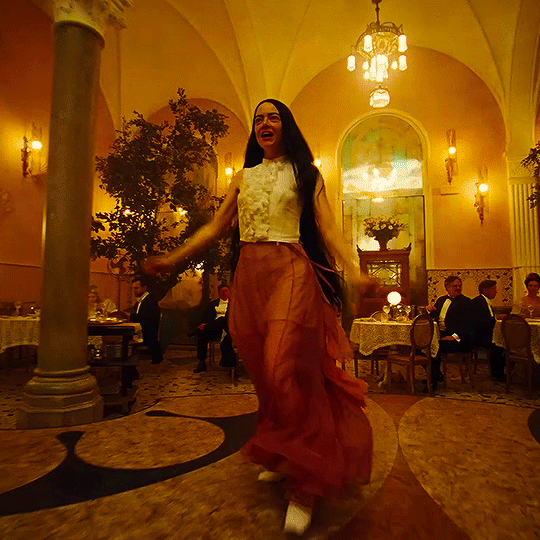
Is Poor Things a feminist film? Seems to be a key question in the discourse. But I think that we need to take a moment to question what this concept actually means, what is a feminist film? Whilst there are many great smaller films that cover feminist topics well, I want to focus on these big blockbusters as these moneymakers allow us to also think about the role capitalism plays in this debate. Film is an industry after all. A common theme in these female-led Oscar noms is that none of them are labelled as ‘feminist’ in their promotional materials. Feminism is still a divisive term, and in the pursuit of profit, it can be risky to give a film such a label. ‘Feminist’ is a label that is both given and taken away by the media and discourse surrounding a film. it is an umbrella term for various socio-political movements, it is a lens in which to view the world and a standard to hold things to. How could this be encapsulated within a film? Within Feminism itself there are internal arguments, one person's feminism may look completely different to someone else's.
Take a look at Barbie, celebrated by some as a feminist classic, but belittled by others as not being feminist enough. How could Barbie be a perfect feminist film? In 90 minutes could the film have covered aspects of a movement that’s history varies so hugely from country to country. There wouldn’t be time to then expand into intersectionality*, would Warner Bro’s dare discuss abortion issues, Barbie meets a TERF? By putting both Barbie and Poor things up to this impossible feminist standard it leads to them being torn down by an angry mob. It is important to view film critically, especially when these topics are covered, but when these films face so much backlash it can have knock on effects and scare filmmakers from attempting to cover women’s issues in their projects. Barbie is a film that set out to make money, it’s based on a bloody toy! While we can acknowledge that there were issues with the topics covered, it is important to also be grateful that a film like this exists, made so much money and definitely introduced or expanded upon feminist topics to the audience.
This leads me to ask, where is this energy for films without a male lead? Feminism can be a critique applied to all films yet seems to only be extended to those with a female lead. Just because a film has a female lead doesn’t mean it is feminist. I think this echoes the emotional labour that society puts on women to represent feminism and fight for respect for themselves and other women. Do we all lack the object permanence to remember feminism unless we’re directly gazing upon a woman? In order to be successful, feminist practices need to be adopted in all aspects of a film, yes with female characters, but also behind the screen. A role can be written and directed by a man, just because it is played by a woman does not mean it is feminist or not exploitative.

Capitalism wants to sell us feminism as this neat little package, it wants us to buy into it and forget that there is no way to price an ideology. Poor Things is a fantasy film, not a feminist film, feminism is not a genre. Yes, there are Feminist themes, but there are also prominent themes of class issues, yet no one is rushing to label it as a communist film. If we cannot decide a set framework or criteria for a feminist film, we need to stop trying to use that label. Feminism is a critique that can be applied to all media, and feminist debate surrounding film needs to also expand to cover those behind the scenes. Let’s just enjoy some cinema and accept that it cannot fit into the high standard, but by sparking a conversation it can do more and still be used to educate people.
*Hey, don’t know about intersectionality? Thats cool, but you should acquaint yourself. Intersectionality in feminism is an acknowledgement that gender based oppression isn’t one size fits all and that other factors such as class and race can have a huge effect. Read up
15 notes
·
View notes
Text
#ShowsWeLove: The Color Purple (2023) – A Story of Pain, Resilience, and Redemption
“I think it pisses God off if you walk by the color purple in a field somewhere and don’t notice it.” – Alice Walker, The Color Purple The 2023 adaptation of The Color Purple revisits the heart-wrenching and triumphant story of Celie and the women who shaped her life. This film is more than a story—it is a reflection of the cycles of abuse, the impact of racism and misogyny in the Jim Crow…

View On WordPress
#Alice Walker#Black history#Black women in cinema#book to film#Colman Domingo#Corey Hawkins#Danielle Brooks#Fantasia Barrino#feminism in film#Film Adaptations#film review#H.E.R.#Halle Bailey#Historical Fiction#Jim Crow South#movie analysis#musical adaptations#Phylicia Pearl Mpasi#redemption#resilience#Sisterhood#Taraji P. Henson#The Color Purple#The Color Purple 2023
0 notes
Text
Just watched this movie for the 1st time and I'm obsessed.
We don't talk about 'Atlantis: The Lost Empire's Helga Sinclair nearly enough, and it's about damn time that we started, I think.
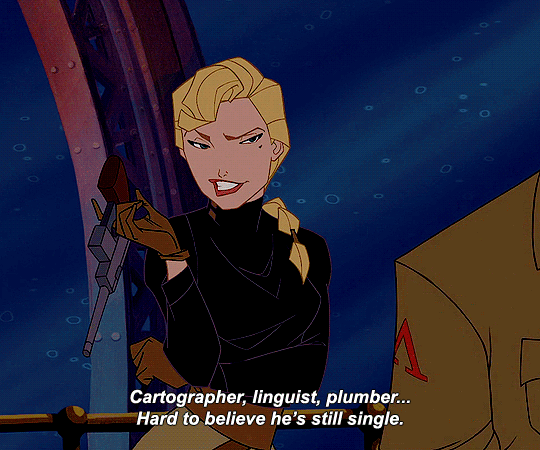
For context, we're talking about the year of our Lord 2001. As far as I recall (and bear with me, I was about 5 years of age at the time) the feminist undertones that have flooded Hollywood films in recent years - as, arguably, a direct result of the 'Me Too' movement - weren't particularly noteworthy, much less noticeable.
There were some outliers, quite possibly, but it was pretty 'meh' at this point in the game, when it came to empowerement, feminism, and straight-up compelling female characters in the animated film front. They weren't the norm, or the trend. We were lucky if a Disney Princess managed to subvert expectations - even just a little - in a satisfying way, rather than fall prey to tired old tropes, such as the over-sexualization of female characters. Exhibit A: Pocahontas.
(feel free to correct me if I'm mistaken)
So, here comes Atlantis: The Lost Empire, at the turn of the milennium, blaring a horn that seemed to say 'hold my beer'. To this day, I still find it shocking that this film actually got made. The representation present in this film is so staggeringly good, it makes me mad and want to cry. It's that good.
Sure, you could easily try and argue that in certain regards it falls prey to stereotypes from the groups it tries to portray, but this is one of the very few films that I'd be willing to argue (and defend) didn't actively do it out of malice, or as a blatant, on-the-nose attempt at representation as we see on today's blockbuster-obsessed film landscape. It reads more like an honest attempt, flawed though as it may be in some regards, rather than being the butt of a lazy punchline.
It's not your typical 'Le Fou is going to be our first gaaaaaay on the live-action remake Era! 🌈 #Pride ' or 'empowering feminist moment in an MCU film, deeply undercut by the fact that this character barely has any screen-time or a compelling character arc'.
The representation in Atlantis - again, perhaps not perfect, if you actively try and find glaring flaws in it, you absolute killjoy - was simply way ahead of its time. And, sadly, remains to this day. Few films today seem as invested (as Atlantis) to try and replicate what adds up to a genuinely groundbreaking moment in modern cinema history. Hell, some films seem downright terrified of the prospect, due to fear of poor box office returns, being cut out of certain foreign markets - who happen to bring in a lot of money... as long as you stay in line and don't try anything too radical - or worse: turning out to be problematic. Hastag gasp.
How many queer characters have been kept secret or vague or relegated to a blink-and-you-miss-it scene in the past 5-or-so years? Off the top of my head, you've got Paranorman, Frozen, Finding Dory, with many other films like Storks and The Mitchell's vs. The Machines faring a little better, with the end result being equally unsatisfying and restrained. And that's just in the animated film landscape. 3 second lesbian kiss on Rise of Skywalker, anyone? Le Fou in Live-action Beauty and the Beast? Gay *unnamed* character in Avengers: Endgame? Queer-coding in Frozen? LUCA?
(again, if you feel like some of this examples are unfair to enlist, feel free to explain why)
So, Helga Sinclair. What. A. Character. Here comes a woman who seems insanely -refreshingly so - confident in her own body, who likewise seems well aware of her sex appeal, and who, even in her very last moment - despite being painfully aware that this is the end of the line for her - decides to go (not so) gently into that good night with an EPIC one-liner that remains engraved in many of our heads to this day. Ugh, her MIND. When I think of memorably female characters in animated films, she's easily in of the top spots.
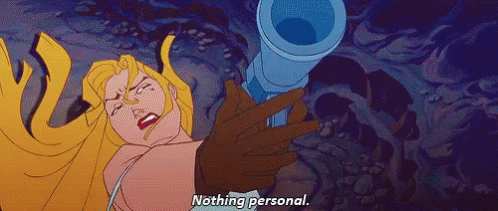
On top of that, I feel like queer folks - especially women - can find a lot to love in her character. Her confidence, her sass, the animation work, the voice acting, her physicality, the fact that she feels like an active participant in the story and like there's more to her than meets the eye. She's one of the antagonists, but you can literally see her hesitation, and her shock, and how she reacts to the world and situations she's caught up in. She's not just a villainesque, femme fatale-type, one-note side-kick. She's a legit character that's a joy to learn more about. As a queer man, I find her character to be so flawlessly executed, even though she's neither a protagonist, nor queer (arguably), or one that has such a significant amount of screentime, compared to a character like Kida or Milo.
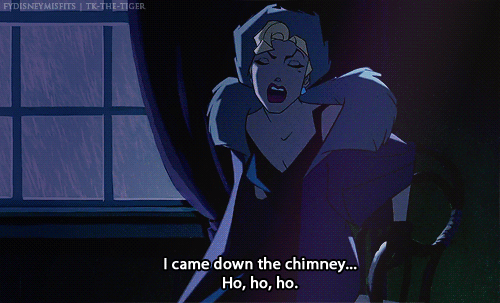
So, you know, give us more of that, perhaps? Not just more characters like Helga Sinclair (boy, do we need them), but just... more daring and inclusive and unique films. Don't be afraid to make mistakes; work your hardest to make sure you avoid them in the first place. Listen and be humble. Approach individuals who actually know about our respective struggles as minorities. Don't guess; ask.
And even if you do make mistakes, why let that discourage you from trying? I'd take a refreshing and unique character - or narrative - that tries to approach storytelling differently, over the sterilized, formulaic tired-old tropes that are quickly becoming the only way to approach representation in film and the media we consume in general.
Take risks, and try. It's okay not to be perfect and right, all the time.
#representation#Atlantis The Lost Empire#Helga Sinclair#feminism in film#essay#but like#in written form#so literally an essay#I'm sorry I watch a lot of video essays on YouTube#I miss you Lindsay Ellis#We didn't deserve you#this movie is so fucking good and amazing and i love it#one of the most underrated movies ever#I will die on this hill a thousand times if I have to
149 notes
·
View notes
Text

laurie and dave vanian
#goth#gothic#80s#band#the damned#90s#black eyeliner#mustang#vintage#style#fashion#old hollywood#singer#dark feminity#makeup#aesthetic#poetry#old films#pinterest#photography#art#love#blog#music#old music#80s fashion#vampire#black is beautiful#80s goth#sisters of mercy
617 notes
·
View notes
Text
last year Barbie lost the oscar. this year The Substance lost the oscar. The Substance won one oscar, for “best make up and hairstyling”. this year Anora won the oscar, a film made by a man and a film that normalises prostitution. the films made by women and adopting a feminist perspective didn’t stand a chance, even though we can say Barbie had a lot of publicity. even though they were praised by both the public and the specialised critics. why is that ? what does it tell us about our society ? what happens around the films, how they are welcomed, treated and awarded (or not), is as much fascinating and telling as the films themselves.
440 notes
·
View notes
Text


This is something a serial killer in a bad Hollywood movie says. GOP strategists openly say thid.
How are women in the USA not going Kill Bill on men right now?

#Trump#us politics#democrats#republicans#politics#feminism#woc#films#usa politics#potus#project 2025#Trans#Me too
607 notes
·
View notes
Text
why do movie characters love their wives more when they’re dead or missing or murdered or something.
I never see men like the guy in memento or John Wick before their wives are killed when they’re supposedly meant to be like So in love with their wives— except for in flashbacks which motivate violence. Idk just a thought
#John wick#memento#thoughts#feminism#film#letterboxd#silent hill#american nightmare#Alan wake#textpost
245 notes
·
View notes
Text








Maria Schneider, 1983 (Elisabeth Subrin, 2022)
#Maria Schneider#Maria Schneider 1983#Elisabeth Subrin#2022#short film#quote#documentary#film#cinema#power#feminism#women#woman#Manal Issa
219 notes
·
View notes
Text





...not becoming of a girl
#nightbitch#night bitch#amy adams#motherhood#being a mother#mother#motherhood journey#motherhood challenges#parenting#mom life#kids#parents#movies#films#fyeahmovies#movie quotes#movie stills#intersectional feminism#feminist#divine feminine#feminism#movie quotations#filmedit#film caps#film quotes#film stills#girlhood#growing up#adolescent#gender expectations
222 notes
·
View notes
Text
Human vs Vampire Violence in Nosferatu
I've talked about this in the tags of another post already but i can't stop thinking about this so here it goes:
The majority of Ellen's suffering is due to mundane and socially acceptable forms of violence (e.g. medical) and that is not an accident. The script intends this. It is the primary underlying theme of Nosferatu (2024), it is the undercurrent to all her motivations, and the film wants the viewers to be aware of this, at least on some level.
Over the course of the story, Ellen Hutter is forcibly isolated by her father, dismissed and infantilized by her husband, drugged and tied to her bed by a doctor and her husband's friends, pierced through the arm by another doctor just to demonstrate that her soul "isn't there," insulted and kicked out from the Hardings' house (while still having psychic fits nightly), left to care for her sick husband alone without any support, never listened to - and all these things are excused!..
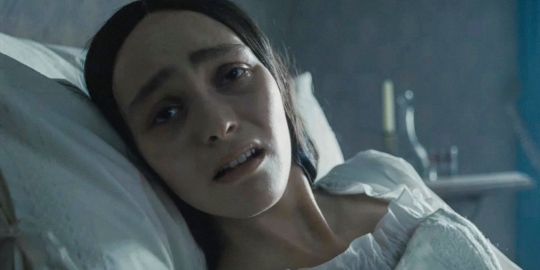
There's always some sort of justification, and it's usually either misogynistic or medical or both.
Her father isolated her because her psychic abilities frightened him, because she was too abnormal, and he thought that she wasn't fit to be around other people. Thomas dismissed her nightmares and ignored her emotional needs because he thought her anxieties were childish, that she prioritized the wrong things in life (love over financial advancement), and that she was incapable of good judgement; it's also the reason he is unaware that she doesn't like cut flowers, or that Harding hates her (even though she is very well aware of that, she evidently didn't feel like she could tell her husband). Similarly, Dr. Sievers believed that he had to do what he did, because Ellen was mad and had to be controlled. Harding, naturally, let him do it, and then did worse, and justified it all with “logic” and family values.
The point is that every single character harms Ellen on some level, despite what they might consider best intentions; and I think that a significant drive behind some of the more vitriolic online responses to this film is that many people are uncomfortable with that aspect of the story. Nosferatu demands that the viewer confront a fundamental truth of human imperfection - that someone who looks soft and Normal is, in fact, capable of causing pain regardless; and that invites a deeper sort of self-reflection. Perhaps, even accountability.
Our recently-resurgent purity culture shares this discomfort with Ellen's societal setting. For Thomas, for Sievers, for Harding, for us, it is much easier to blame harm and sin on a Monster From Somewhere Else, and pretend that a witch-hunt would entirely eradicate the problem.

However, the film demonstrates the inherent falseness behind this assumption. Even if Ellen had not followed Orlok into death, she would not have suddenly become happy with her human life - because his destruction would not have changed how she is perceived. She would have continued to endure far more insidious, systemic, violent abuse as a disabled, arguably queer wife and woman.
This is why the sensuality of her death/wedding is so crucial to the presentation of the film.
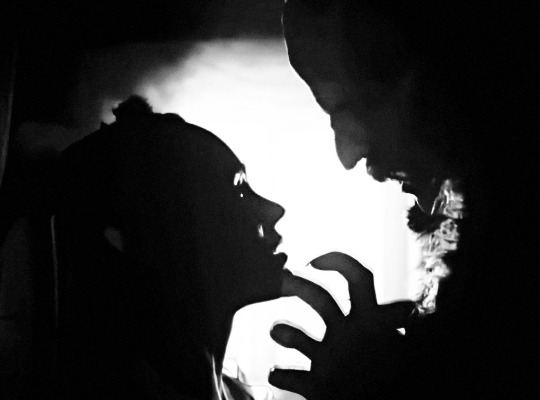
in Orlok, she embraces her own perceived "darkness," the aspects of her that her society believes are harmful and grotesque - her lack of deference to her husband (he terrorizes Thomas), her queerness (he drains Anna and destroys Harding's family), her psychic disability (he kisses Ellen's heart and drinks from her, reverent and tender). it is a scene steeped in both terror and ecstasy. She is joining Orlok in sin and in death - a twisted version of his proposed eternity; and in doing so, she is ascended.
It is incredibly poignant that, when her power over him is actually shown, it is far more emotional and commonplace than could be expected. There are no torches or stakes, no physical explicit battle; Ellen's unique, magnificent, holy power is merely the ability to ask for "more!.. More!" - and be granted that wish without question. Here, in a monster's embrace, she is valued more than a promotion, or propriety, or even Orlok's own life.
All that to say - Ellen's personal journey through the film does not culminate in a straightforward battle of "victim vs abuser." Despite what a cursory overview might imply, the Final Struggle is a minor aspect; instead, the overwhelming majority of her story revolves around a build-up to a Final Choice. Similar to I Saw The TV Glow, or NBC's Hannibal, or a multitude of other narratives, it explores the balance between the horror of transformation and the horror of staying the same. A monster might grant the first one if you ask, and it will feel like dying - but society's already forced you into the second.
All there is left to do is make damn sure it kills you.
#nosferatu#nosferatu 2024#ellen hutter#count orlok#lily rose depp#bill skarsgård#robert eggers#feminism#thomas hutter#nicholas hoult#willem dafoe#aaron taylor johnson#nosferatu meta#nosferatu review#horror film#horror film analysis#gothic horror#gothic horror movie#vampire#vampires
199 notes
·
View notes
Text
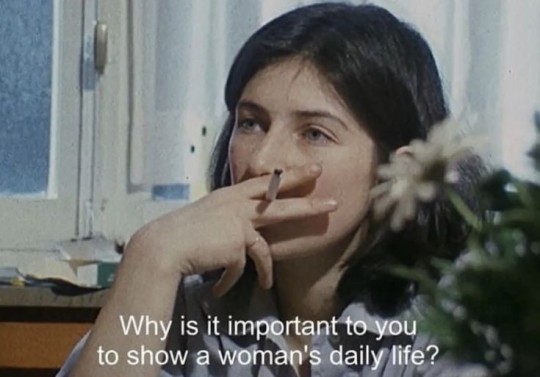

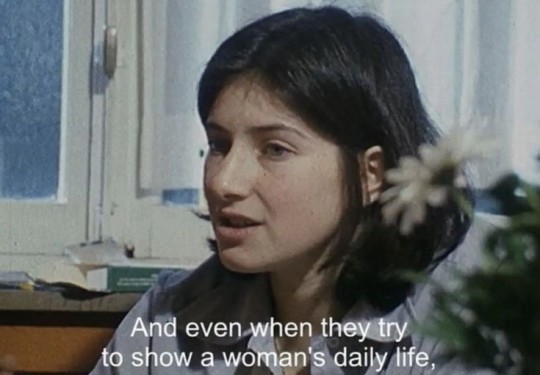
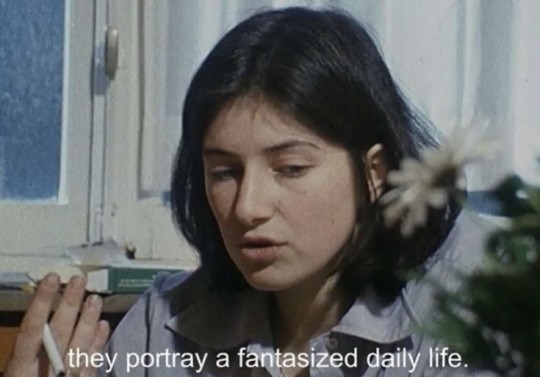
Chantal Akerman (1950 - 2015)
#chantal akerman#feminism cinema#cinema#cult film#bruxelles#jeanne dielman#1970s#feminist film#1970s movies#female artists#female cinema
2K notes
·
View notes
Text
Just saw a "feminist" video essay (by someone who just happens to only talk about feminism in relation to cishet white able bodied women) say that the Hays Code was good for women because it "prevented them from sexualizing women by preventing onscreen depictions of sex". Never before has a video said something that made me vocalize my disgust of it's takes, but this did it.
I didn't think I would have to say this but if you defend the Hays code you are horrible and not in any way progressive. And if you don't know what it is please look it up because it's probably the most important piece of history when it comes to all media analysis in the western world.
#196#my thougts#leftist#leftism#feminist#feminism#queer#media criticism#media literacy#media analysis#the internet#social commentary#discourse#proship#fuck antishippers#hays code#film history#cinema#white feminism
575 notes
·
View notes
Text
activelyblack
Thank you to the Tribe in Los Angeles that came out to our @activelyblack History Month Celebration!! It was amazing to feel the love and energy from all of the people who came to just celebrate US! So many Black people just basking in your Beautiful Blackness 🖤🖤✊🏿✊🏿 With all of the anti-Black rhetoric and energy that is growing, we just wanted to create a safe space filled with Black LOVE. WE DON’T NEED THEIR PERMISSION TO CELEBRATE US! In a world and society that hates you for being who you are, Loving yourself and loving your people is revolutionary and a protest in itself. As the world doubles down on telling you that you are less than, not as smart as, not valuable, etc… We are here to remind you not to believe those lies. THERE IS GREATNESS IN OUR DNA! 🧬🧬✊🏿🖤
#black excellence#activelyblack#black people#black culture#music#black art#black community#black conscious#black couples#black economics#black entrepreneurs#black films#black history#black health#black joy#black liberation#black lives matter#black pride#black spirituality#black tumblr#black wealth#blacklivesmatter#buy black#black americans#black cinema#black feminism#africa#black is beautiful#black history month#black history 365
100 notes
·
View notes
Text

Isabelle Huppert in Madame Bovary, by Claude Chabrol (𝟣𝟫𝟫𝟣)
#isabelle huppert#madame bovary#claude chabrol#photography#art#artists on tumblr#poetry#dark aesthetic#dark romanticism#dark art#female artists#femininity#dark poetry#dark photography#dark beauty#dark femininity#dark fantasy#french actress#dark academia#film stills#films#film photography#feminine#cinema#old films#feminism#cinematic photography
91 notes
·
View notes
Text


. ★ ° : . . • ° . * :. ☆
#une femme est une femme#anna karina#jean paul belmondo#jean luc godard#existentialism#absurdism#vivre sa vie#pierrot le fou#french cinema#lana del rey#vintage film#vintage#daisies#daisies 1966#feminism#femininity#girlblogging#this is a girlblog#coquette#lizzy grant#female hysteria#girl hysteria#lana del ray aka lizzy grant#jean paul sartre#franz kafka
200 notes
·
View notes
Note
They butchered all female characters and it's true, but people can simply don't like Sansa's chapters or don't enjoy her character because she's classist. She thinks bastards are beneath her in earlier chapters and in Alyanne. She's disgusted by Arya spending time with Butcher boy and other peasants because they're beneath her.
I'm not saying she's s bad person or the worst one or that we should blame her for being passive while being hostage. She's a kid, she's s victim, she can still have a positive change. but I'm reminding that saying people are misogynist because they don't like her is a reach. And it's not that people hate her, they just point out things she did or thought about in canon and her fans scream "you hate her! You hate women!" No. It's okay to not like a character, you can point out their flaws, it doesn't make you a mysoginist.
Oh, trust me, the issue isn’t that people simply don’t like Sansa—it’s why they don’t like her and the patterns that emerge when you look at how traditionally feminine female characters are treated in fandom discourse.
See, I don’t care if someone criticizes Sansa for her classism. That’s a valid discussion. I don’t care if someone dislikes her personality. Not every character is for everyone. But let’s not pretend that the dominant criticism Sansa gets in fandom spaces has ever been about her early prejudices. No one’s out here writing essays about how Sansa Stark needs to deconstruct her internalized feudal biases. What do we see instead?
“Sansa is useless.” “She’s weak.” “She’s stupid.” “She just stands there and does nothing while other people suffer.” “She should have done something.”
And that’s where misogyny enters the chat.
Because when you actually break these takes down, what they boil down to is that people resent Sansa for not being proactive in the way that they think a strong female character should be. She’s written as a character whose resilience is passive rather than active, who survives through adaptability rather than aggression, and fandom hates that. This is a known trend in media reception.
Feminist film and literature studies have examined this bias for decades. De Beauvoir discusses how femininity is traditionally coded as passive, and because of that, it is devalued in comparison to traditionally masculine-coded traits like physical strength, direct confrontation, and assertiveness. Susan Faludi discusses how women who embody traditional femininity often face more ridicule than those who adopt “strong” or “unconventional” roles. And the male gaze, as theorized by Laura Mulvey, conditions audiences to respond more favorably to female characters who are active participants in traditionally masculine-coded spaces—combat, strategy, direct rebellion—while dismissing those who navigate systems through softer, less immediately visible means.
Sansa fits this mold perfectly. She does not fight with a sword, she does not make grand speeches, she does not take direct violent action, so fandom deems her “useless.” But here’s the catch—this standard is not applied equally.
Think about how Tyrion is treated for his ability to navigate the political landscape through words rather than force. Is he called “useless” for not picking up a sword and charging into battle? No—because intellect and political maneuvering, even when nonviolent, are still considered active and thus valuable in a way that Sansa’s more passive survival is not.
Now, compare Sansa’s treatment to Arya’s. Arya is beloved in fandom spaces, and yes, she has her own set of haters, but notice how different the tone of that criticism is. Arya is rarely called “useless.” She is rarely ridiculed for being afraid. She is allowed to be traumatized, to make mistakes, to be messy and complicated in ways that Sansa is not—because Arya performs a more masculine-coded form of resilience. She fights, she kills, she runs, she rebels.
And just to be clear, none of this means that Arya’s arc is bad or that her popularity is undeserved. The problem isn’t that Arya is liked—it’s that traditionally feminine resilience is not. The issue is that Sansa is not disliked because of her flaws in isolation, but because those flaws reinforce her femininity, and femininity is what people are actually responding negatively to.
This is why calling Sansa hate misogynistic is not a reach. It’s not about saying that everyone has to like her. It’s about looking at the larger pattern of why she is dismissed, why she is mocked, and why so many people cannot accept a female character whose form of strength does not align with masculine-coded ideals.
So no, I’m not saying that every single person who dislikes Sansa is a raging misogynist. But I am saying that if your criticism boils down to “she’s useless, she’s weak, she’s stupid,” you should probably examine why those specific critiques keep coming up for female characters who embody traditional femininity. Because it’s not a coincidence.
#sansa stark#sansa stakr defense#asoiaf#a song of ice and fire#got#game of thrones#female in media#feminist theory#feminist film theory#feminism#female characters
76 notes
·
View notes